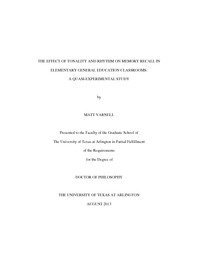
ATTENTION: The works hosted here are being migrated to a new repository that will consolidate resources, improve discoverability, and better show UTA's research impact on the global community. We will update authors as the migration progresses. Please see MavMatrix for more information.
Show simple item record
| dc.contributor.author | Varnell, Matthew R. | en_US |
| dc.date.accessioned | 2013-10-23T00:00:03Z | |
| dc.date.available | 2013-10-23T00:00:03Z | |
| dc.date.issued | 2013-10-23 | |
| dc.date.submitted | January 2013 | en_US |
| dc.identifier.other | DISS-12293 | en_US |
| dc.identifier.uri | http://hdl.handle.net/10106/23937 | |
| dc.description.abstract | The purpose of this study was to evaluate the effect of rhythm and tonality on an academic memory task by comparing three different treatment conditions: a poem, a rhythmic chant (or rap), and a melodic rhythm (or song). A quasi-experimental experiment was designed and implemented, specifically a pretest-posttest-posttest control-group design. This study took place in the North Texas area in an urban school district on four campuses that were minimally 50 percent economically disadvantaged.The study included 139 second-grade students who gave consent and fully participated in the research study. Data were obtained through pretesting students‟ knowledge of the countries of the world. Treatment conditions were implemented over a three-week period in 12 sessions. A posttest measured change in the knowledge of the countries. A three-week period of non-treatment followed by a final posttest discerned the effect of retention. Following final posttesting, focus groups with teachers were conducted to uncover any anomalies which may have affected results.Independent variables for this study were ethnicity and treatment type and dependent variables were posttest (memory) and final posttest (retention). Differences between all treatment types were significant. For the posttest, main effects were found for both treatment group (p = 0.001) and ethnicity (p = 0.006). Posttest post hoc testing revealed significance between the melodic rhythm treatment and poetic treatment for memory and retention. Post hoc testing also revealed that Asian students responded significantly better to these treatments than other ethnicities.Discussion of findings highlights that increasing complexity of the treatment correlates to increasing task performance, suggesting that the addition of musical elements to an academic memory task improves memory of the content. A discussion of the performance differences with African American males is discussed indicating possible learning differences. Implications and limitations are discussed and recommendations for future research include extending this study into different age groups, into different economic settings, and over longer periods of time, as well as investigating the effects of musical preference on studies like this one. | en_US |
| dc.description.sponsorship | Tobolowsky, Barbara | en_US |
| dc.language.iso | en | en_US |
| dc.publisher | Education | en_US |
| dc.title | The Effect Of Tonality And Rhythm On Memory Recall In Elementary General Education Classrooms: A Quasi-experimental Study | en_US |
| dc.type | Ph.D. | en_US |
| dc.contributor.committeeChair | Tobolowsky, Barbara | en_US |
| dc.degree.department | Education | en_US |
| dc.degree.discipline | Education | en_US |
| dc.degree.grantor | University of Texas at Arlington | en_US |
| dc.degree.level | doctoral | en_US |
| dc.degree.name | Ph.D. | en_US |
Files in this item
- Name:
- Varnell_uta_2502D_12293.pdf
- Size:
- 1.924Mb
- Format:
- PDF
This item appears in the following Collection(s)
Show simple item record


